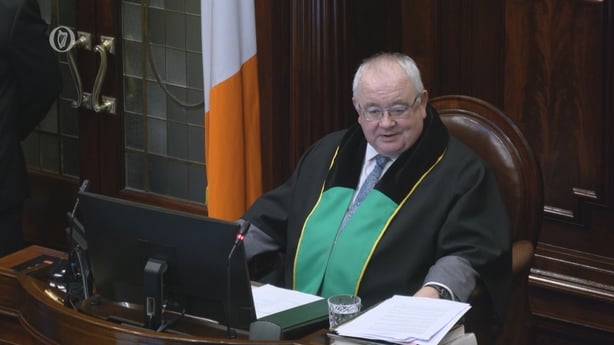Today marks the beginning of building the next coalition government, as the three largest parties hold their first parliamentary party meetings since General Election 2024.
With Fianna Fáil having ten more seats than Fine Gael in the 34th Dáil, Political Correspondent Paul Cunningham assesses what that might mean if, as expected, the two parties enter into Coalition talks.
‘Parity of esteem?’
Fianna Fáil leader Micheál Martin was at Farmleigh last night, the official Irish State guest house in the Phoenix Park, emphasising the requirement for the next government to have a comprehensive and cohesive Programme for Government.
Mr Martin was hosting the erudite British Northern Secretary Hilary Benn, but the subsequent news conference was overshadowed by media questions about coalition formation here.
Fine Gael deputy leader Helen McEntee, also attending the event, was in lockstep with Mr Martin saying the last coalition functioned well on account of having such a detailed agreed document.
The Fianna Fáil leader was absolutely correct when he said that policy will largely dictate the formation of the next coalition.
But, let’s not kid ourselves, the structure of the Government is also going to be key.
Fine Gael is loudly and repeatedly demanding “parity of esteem”, which is being interpreted as the next coalition operating the same way the last government did. But is that possible when Fianna Fáil has ten more seats than Fine Gael? Where might the fault lines be?
Rotating Taoiseach
In their last coalition, Fianna Fáil and Fine Gael shared the office of the taoiseach between them. That was logical when, back in 2020, Fianna Fáil only had three more seats than Fine Gael.
This time, when the gap is ten seats, some in Fianna Fáil think that things need to change to reflect that electoral fact.
Fine Gael has made it clear that a rotating taoiseach must be in any new agreement. But some in the Fianna Fáil ranks think Micheál Martin should hold the office for three years and Simon Harris for just two.
Fine Gael will no doubt point out, in such a negotiating scenario, that in 2016 their leader Enda Kenny offered a rotating taoiseach to Micheál Martin even though he had a six-seat advantage. Mr Martin declined the offer on that occasion.
Cabinet
If Fianna Fáil offers the Fine Gael leader a term as taoiseach similar to that of Micheál Martin, then the focus will shift to cabinet positions.
The ranks of the Soldiers of Destiny will apply pressure for their party to have a greater number of senior ministers than Fine Gael and, possibly, junior ministers too.
The logic will run that Fianna Fáil has a greater mandate and that needs to be reflected in the heart of government. In the political jungle, size matters.
So another option might be for Fianna Fáil to demand it holds certain cabinet portfolios. (One thing both Fine Gael and Fianna Fáil front benchers will be aware of is that if a coalition is forged with Independent TDs, rather than parties like the Social Democrats or Labour, then there will be more cabinet positions for both parties.)
European Commissioner
Last month, former Finance Minister Michael McGrath became the newly minted European Commissioner for Justice. It’s a five year term, after which the government in Dublin can either re-nominate him or select another candidate. As Mairead McGuinness found out, re-nomination doesn’t always happen. This is the type of issue which Micheál Martin could demand is a Fianna Fáil call.
Ceann Comhairle
Under the rules, the Ceann Comhairle of the Dáil is no longer a position which can be dictated by the government. Instead, it will be a private vote of all 174 TDs.
However, the Fianna Fáil leader could request that an experienced deputy from his party secure Fine Gael backing for the post. If that’s agreed within the coalition negotiations – whether that’s with a centre-left party or a group of independents – then the majority which propels them into office could also secure the post of Ceann Comhairle.

It’s not straight forward – it was rumoured that Micheál Martin didn’t want Seán Ó Fearghaíl (above) to become Speaker of the House, as he would reduce Fianna Fáil’s numbers, but that’s what happened.
The 5th floor
Before even outlining this next suggestion, it’s necessary to say that it will be dismissed as ridiculous by the Fianna Fáil hierarchy. Nonetheless, in the 2011 General Election, Fianna Fáil lost 57 seats. Just 20 of its TDs were returned to Leinster House.
Amid the political carnage, a small matter emerged which still rankles to this day: the significantly reduced ranks of Fianna Fáil TDs had to vacate their offices in Leinster House and move to the new extension which is unimaginatively called LH-2000.
Could it be, in 2024, that Fianna Fáil seeks to return to its rightful place in the ducal palace of the Dukes of Leinster? The public might not be care but it would be a psychological boon to a party which feels it’s on the up.
Admonished
It should be said that a few Fianna Fáil deputies were not intrigued by interest in the political chess of future government structure. One texted me, with a slightly disappointed air: “No doubt there will be the occasional tribal dance but I trust Micheál Martin to bring his considerable political experience, wisdom and calm to bear on any discussions in the coming weeks.”
Let’s see.
